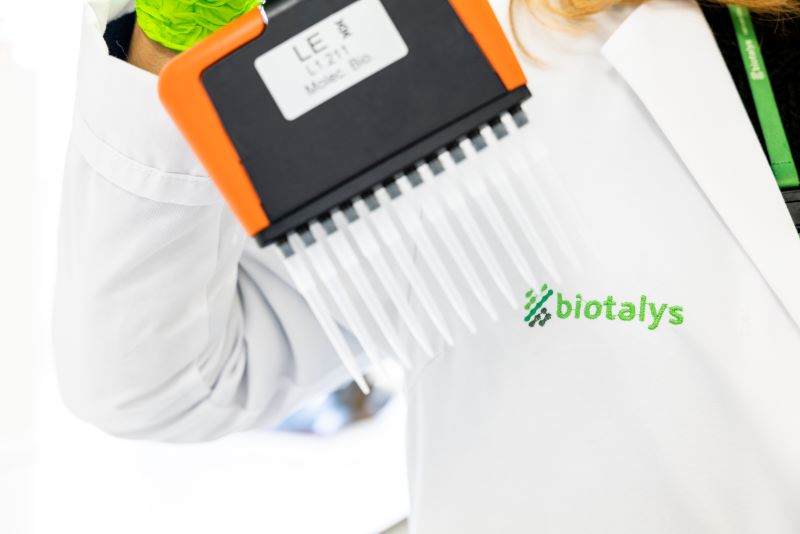
Raleigh ag biotech executive begins new CEO role at Biotalys
After his 30-plus years of work in agricultural technology, one thing is crystal clear to Kevin Helash.
“No matter where I travel in the world, consumers are looking for safe, healthy, affordable food produced with less chemicals,” he said in an interview.
Helash is now well positioned to help meet that demand. He recently became chief executive officer of Biotalys NV, an ag biotech company that is developing safe, effective and environmentally friendly biologicals to protect food crops from pests and diseases.

That prospect “is very intriguing and exciting for me – to be pioneers and really bring something truly new to agriculture,” Helash said. “I think this company has the potential to truly be a disruptor in the sector.”
Screening for effective proteins
Biotalys, headquartered in Ghent, Belgium, with a small U.S. subsidiary in Raleigh, has developed a proprietary platform technology called AGROBODY Foundry that automatically screens thousands of “antibody-inspired” proteins for activity against a wide range of crop pests and diseases.
“When I discovered that they were developing large-protein crop-protection products with a platform that could deliver multiple new modes of action, I was sold,” Helash said, recalling his recruitment to lead Biotalys. “I was like, I haven’t seen anything like this in my entire career. This is truly groundbreaking technology.”
The company’s protein-based controls attack crop pests and diseases in different ways than conventional synthetic products, potentially giving growers more options to improve crop yields while limiting plant resistance to controls, Helash said.
After they’ve done their job in the field or greenhouse, the proteins break down into their constituent amino acids, which are harmless to growers, consumers and the environment.
First product a biofungicide
The company’s first potential product, to be marketed as Evoca, is a biofungicide against two damaging fungal diseases, powdery mildew and Botrytis, also known as gray mold.
“Botrytis arguably is one of the top challenges in agriculture globally,” Helash said. “That’s why we focused there. It’s a big market, it’s a challenging market, both from a resistance-management standpoint and from a regulatory perspective.”

initially in the Landing Pad at the North Carolina
Biotechnology Center in Research Triangle Park.
-Photo from Biotalys
The active substance in Evoca is a polypeptide that interferes with lipids, the fatty compounds found in the cell membrane of fungal spores. The membrane ruptures, killing the spore.
Growers can spray Evoca onto crops just as they do conventional synthetic fungicides, without any special equipment.
“The objective for us and our platform is that our products can be seamlessly integrated into an integrated pest management program with the grower,” Helash said.
Evoca is intended for high-value fruit and vegetable crops including grapes, strawberries, tomatoes and cucumbers. It has been tested extensively in field trials and is under regulatory review in the United States and the European Union.
Helash already has been on two calls with representatives of the U.S. Environmental Protection Agency (EPA) and is working with his staff and consultants to answer the agency’s questions about Evoca.
“Obviously, getting Evoca approved by the EPA is a very important milestone for us,” he said. “We think we’ve got Evoca well categorized now in terms of what it can do and what we expect it will do in the field.”
Evoca won the World BioProtection Award in 2022 for Best Biofungicide Product. The award was based on the innovative character, scientific value and market potential of the product.
Biotalys has begun looking for partners to help it with formulation, production and distribution of Evoca in the U.S., Europe and other countries, Helash said.
The company already has a partnership with Novozymes to provide additional methods of upscaling and producing the bioactive protein in Evoca.
Initial priorities
Helash has been at the helm of Biotalysis since early October and has spent that time learning about the company, getting to know its staff, devising a strategic direction and preparing for his first board of directors meeting in December.

He has visited the company’s Belgian headquarters, where most of the 70-person staff works in research and development and back-office functions including finance, investor relations and human resources. He and two others work from Raleigh, where he expects to add a few more employees over time to help address the U.S. market.
“As we continue to grow, certainly the U.S. is going to be a core market for us,” Helash said.
Biotalys was founded in 2013 as a spin-off from the Flanders Institute for Biotechnology, a research institute created by the Flemish government in 1995. The company’s stock is traded on the Euronext Brussels stock exchange under the symbol BTLS.
The company’s U.S. subsidiary was created in 2020 and was located initially in the Landing Pad at the North Carolina Biotechnology Center in Research Triangle Park. The Landing Pad provides office space and professional services to life science companies establishing a new footprint in the state.
A passion for biologicals
Helash was recruited to Biotalys after the company’s previous CEO of four years, Patrice Sellès, left in mutual agreement with the company. At the time, Helash was CEO of EnviroKure, a Philadelphia-based company that sells biostimulants and biofertilizers derived from chicken manure.
Before that, Helash was CEO of Raleigh-based Marrone Bio Innovations, a biological crop solutions company. He left that position in 2022 when Marrone merged with Bioceres Crop Solutions and moved its headquarters to Davis, Calif., where it is now known as ProFarm.
Prior to Marrone, Helash was CEO of Agrinos, a Canadian provider of microbial and biological products for crop plants. He joined Agrinos after 12 years with Agrium (now known as Nutrien), a global fertilizer company based in Canada.
It was at Agrium that Helash was exposed to the growing potential of biological solutions to agricultural problems, as many innovative ag-biotech companies approached Agrium seeking partnerships.
“It really amazed me to see how many companies were involved in ag biotech and how many new products were coming into the marketplace – and very interesting products,” he recalled. “I was quite intrigued.”
The more he talked to growers about the merits of biological controls versus synthetic products, the more convinced he was that biologics had a bright future.
“So I made my mind up that this is the sector of ag that I really wanted to spend the majority of my time and energy on,” he said.
Canadian farm roots
Helash is a native of Manitoba, Canada, where he grew up on a family farm that “had a little bit of everything” including canola, barley, oats, wheat and cattle. He studied agriculture at the University of Manitoba.
His wife also has an agricultural business degree from California Polytechnic State University, and two of their three children have agricultural degrees and work in the industry.
“We’re an agriculture family for many, many years,” Helash said. “I’m happy to see that the legacy will continue with my children.”
